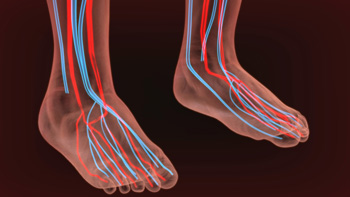
Poor circulation occurs when blood flow through the vessels is reduced, often due to conditions like diabetes, peripheral artery disease, or prolonged inactivity. When circulation is compromised, the feet may feel cold, numb, or tingly and may develop slow-healing wounds or discoloration. These symptoms can increase the risk of infection and make everyday activities more difficult. A podiatrist can assess blood flow, identify underlying causes, and provide treatments to improve circulation and foot health. This may include lifestyle guidance and wound care tips. If you notice changes in your feet, such as temperature shifts, swelling, or sores that do not heal, it is suggested that you visit a podiatrist promptly who can provide a proper diagnosis and treatment.
Poor circulation is a serious condition and needs immediate medical attention. If you have any concerns with poor circulation in your feet contact Gerard Skaziak, DPM of Lakeview Family Foot Care. Our doctor will treat your foot and ankle needs.
Poor Circulation in the Feet
Poor blood circulation in the feet and legs is can be caused by peripheral artery disease (PAD), which is the result of a buildup of plaque in the arteries.
Plaque buildup or atherosclerosis results from excess calcium and cholesterol in the bloodstream. This can restrict the amount of blood which can flow through the arteries. Poor blood circulation in the feet and legs are sometimes caused by inflammation in the blood vessels, known as vasculitis.
Causes
Lack of oxygen and oxygen from poor blood circulation restricts muscle growth and development. It can also cause:
- Muscle pain, stiffness, or weakness
- Numbness or cramping in the legs
- Skin discoloration
- Slower nail & hair growth
- Erectile dysfunction
Those who have diabetes or smoke are at greatest risk for poor circulation, as are those who are over 50. If you have poor circulation in the feet and legs it may be caused by PAD and is important to make changes to your lifestyle in order to reduce risk of getting a heart attack or stroke. Exercise and maintaining a healthy lifestyle will dramatically improve conditions.
As always, see a podiatrist as he or she will assist in finding a regimen that suits you. A podiatrist can also prescribe you any needed medication.
If you have any questions please feel free to contact our offices located in Guntersville and Albertville, AL . We offer the newest diagnostic and treatment technologies for all your foot and ankle needs.
